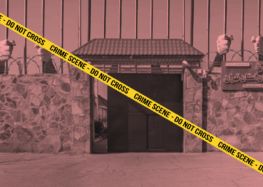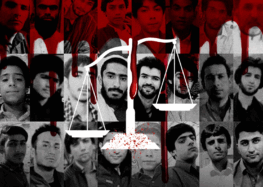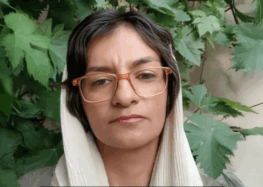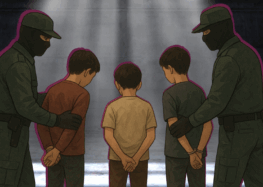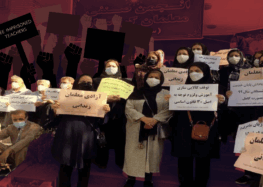Iran’s New Tactics to Crush Mandatory Hijab Resistance: Business Raids and Surveillance
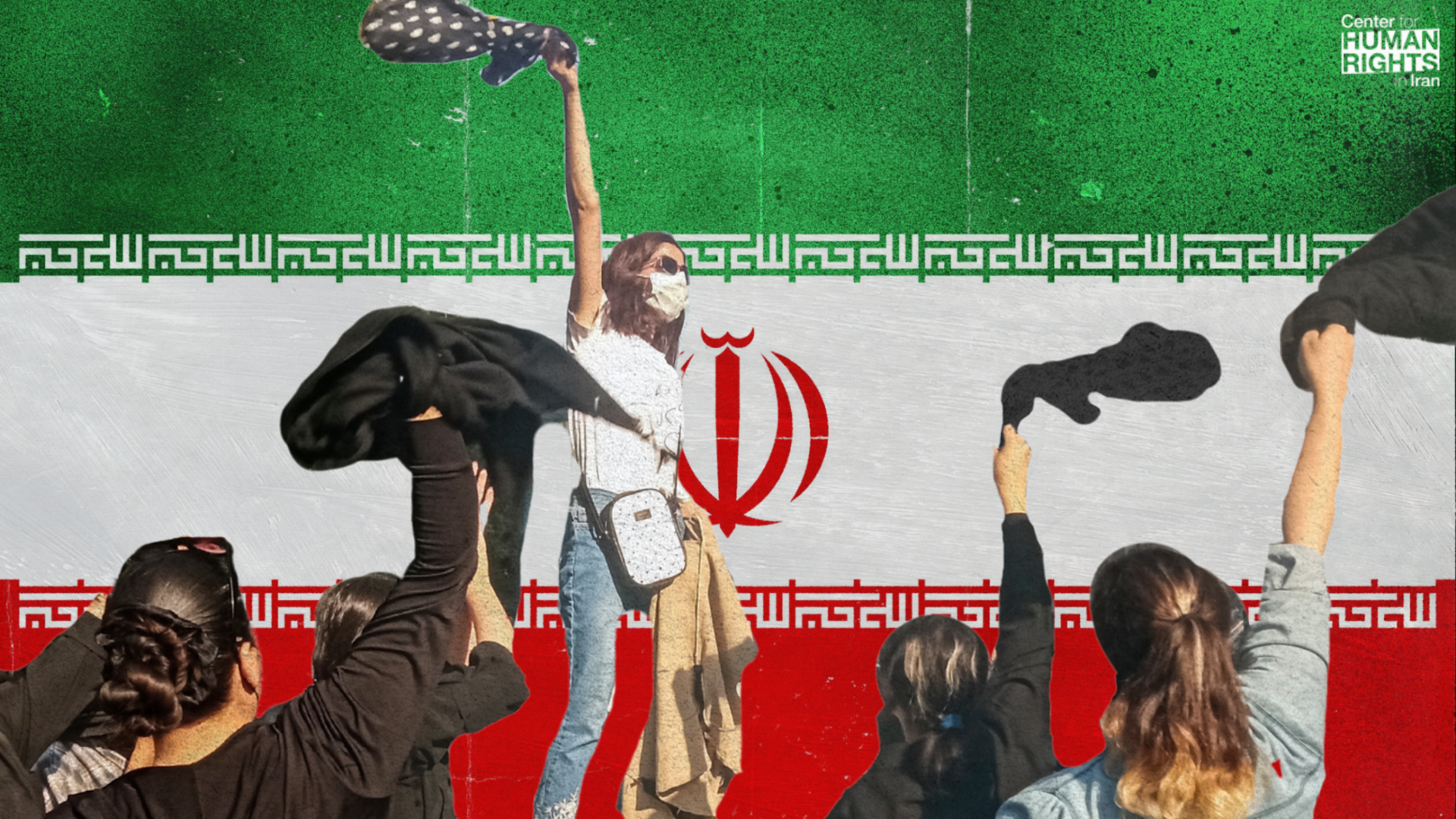
Closures, Undercover Agents, and Prosecutions Replace Street Patrols in New Phase of Mandatory Hijab Enforcement
October 15, 2025 — The battle over the mandatory hijab in Iran is far from over. Despite the stream of videos showing women walking unveiled on the streets, this defiance does not signal freedom—it reflects enduring, and often costly resistance to the state’s repressive domination of women.
Research by the Center for Human Rights in Iran (CHRI) indicates that mandatory hijab enforcement has, in fact, morphed in insidious ways. Key points:
- Businesses serving women not wearing the hijab are increasingly being closed and their proprietors prosecuted, especially in smaller cities and towns outside Tehran;
- Electronic surveillance and the deployment of undercover agents are intensifying, resulting in both fines and prosecutions for noncompliance with mandatory hijab, as well as for mixed-gender gatherings.
“Women in Iran are still being surveilled, fined, and jailed for exercising their fundamental right to freedom of expression and their right to peacefully refuse adherence to deeply discriminatory laws,” said Bahar Ghandehari, director of advocacy at CHRI.
“The Iranian authorities may be refraining—at least for now—from overt and violent public crackdowns on women for “improper hijab,” but they have in no way relinquished their fight against women’s freedom. They have only changed their tactics,” Ghandehari said.
CHRI calls on the UN and governments worldwide to continue to demand the repeal of the Islamic Republic’s mandatory hijab laws—as well as an end to its deeply repressive and discriminatory laws and practices, which continue to subjugate women.
Dozens of Establishments Closed, Surveillance Increased, Undercover Agents Deployed
CHRI has documented that at least 50 establishments, including cafes, restaurants, wedding halls, and clothing boutiques, have been sealed by the authorities between late June and early October 2025 under the pretext of “improper hijab” for serving unveiled women.
The closures have taken place in Tehran, Borujerd, Kashan, Shiraz, Fasa, Qom, Ahvaz, and Dezful, with authorities arresting citizens and business owners, and filing judicial cases against them.
The vast majority of these cases have taken place in towns and cities outside Tehran. For example, there have been at least ten closures in Kashan and eleven establishments closed in Borujerd (representing a high proportion of the restaurants and cafes there), compared to five in the much larger Tehran.
In several instances, cafe owners and customers were apprehended after authorities shuttered their business for hosting “mixed-gender” events, which violate the government’s public morality and mandatory hijab regulations.
While the laws in Iran criminalizing hijab noncompliance remain in force, their enforcement now varies widely across cities and regions of Iran, and often looks different from recent years. At times, enforcement is still carried out by the so-called “morality police,” but now it is increasingly through electronic surveillance cameras and fines rather than direct confrontation, and the shuttering of businesses that serve unveiled women.
Findings by CHRI also indicate that while hijab enforcement has become less visible in the streets and the capital Tehran, it continues aggressively in other parts of the country, particularly in smaller cities, where authorities have been intensively targeting local businesses as proxies for enforcing compulsory veiling.
“They threatened that if an unveiled woman was seen in the cafe again, I would face serious consequences.”
A cafe owner in Andimeshk, Khuzestan Province, described the climate of intimidation:
“In a small city like Andimeshk, everyone knows each other. We opened our cafe in late 2022 and gained recognition very quickly. From the very beginning, there was pressure over the hijab issue. Several times, officers entered while customers were inside to give warnings. Once it even turned into an argument, and when I tried to intervene, they treated me aggressively and threatened that if an unveiled woman was seen in the cafe again, I would ‘face serious consequences.’
“After that, I realized our cafe was under surveillance. About a year ago, one afternoon when the cafe was busy — and a few customers were not wearing scarves — three plainclothes agents suddenly stormed in aggressively. One of them shouted at everyone to leave and locked the door behind them. I recognized one of them from his boots — they were military. Without showing any warrant, they came behind the counter and told my brother and me that they had received reports that we were selling alcohol. I told the one I knew, ‘Tell your boss you’ve come to the wrong place. Everyone in this town knows where the alcohol sellers are. You’re just looking for an excuse to discredit us because young people hang out here.’
“Many customers were standing outside watching, and I’m sure some thought we were involved in drugs or crime. In a small town, rumors spread quickly — this hurt our business badly. I’m convinced that since authorities can’t easily target unveiled women in public spaces anymore, they are determined to shut down places like ours by any means. They know the hijab excuse alone isn’t enough to justify closing cafes or restaurants, so they use other pretexts — alcohol, drugs, anything. Eventually, they managed to file a case and shut us down.”
In Qom city, Qom province, residents report widespread closures under dubious claims of “public complaints.” A resident of Tehran who frequently travels between Tehran and Qom for work told CHRI:
“Since the Mahsa movement, I’ve seen many young women sitting in cafes without hijab. Despite strict pressure on cafe owners, I rarely saw them reprimand customers. That’s why many cafes have been shut down, temporarily or permanently. A key issue in Qom is that officers from the Office of Public Venues Supervision often claim to act ‘based on public complaints,’ but no one really knows if those complaints actually exist. That’s an important point.”
In Kashan, Isfahan province, a cafe owner recounted similar experiences:
“Our cafe is in an old house in the city center. Over the past year, authorities have repeatedly cracked down on cafes and restaurants under the pretext of hijab. As a woman, I can’t tell female customers to cover up, even though they are careful not to cause us trouble.
“A few months ago, however, our cafe was shut down for nearly a month because of unveiled customers. When I followed up, I learned that in their report, the Office of Public Venues Supervision claimed that ‘citizens had complained that we served alcohol’ — which was completely false. They told me these were ‘public reports,’ even though the official reason for sealing us was ‘failure to observe Islamic norms.’”
Authorities Also Shut Down Cafes and Arrest Citizens Over Mixed-Gender Gatherings
Despite growing public defiance, the state’s clampdown goes beyond mandatory hijab violations. Authorities across Iran continue to close businesses and arrest citizens over the broader “violations of Islamic values,” which include holding mixed gender gatherings.
On September 3, 2025, a cafe in Qods Town, Qom, was sealed by local police after hosting an opening event with live music and mixed-gender dancing, videos of which were shared online. Authorities said the event caused “public disturbance.” A judicial case has been filed against the cafe’s manager.
Ali Faramarzi, chief of Qom’s Public Places Supervision Police, announced that, according to a resolution by the Provincial Security Council, no new licenses for “cafes” will be issued in the city. Issuing such licenses will only be possible if the business changes its category.
He explained that following the closure of a cafe after its opening event, licenses for cafe businesses in Qom have been suspended.
Two teenage girls were arrested after a confrontation with a citizen enforcing the hijab law outside a cafe in Fasa, Fars Province, on August 19, 2025. A video of the incident, showing a veiled woman confronting the girls over their clothing, circulated widely on social media, prompting judicial action.
Fars Province Prosecutor Kamran Mirhaji stated that both girls were summoned, arrested, and charged and have been transferred to the Shiraz Juvenile Correctional Center. A judicial case has been opened, and the cafe where the incident occurred has been sealed by court order. Authorities also arrested the person who filmed and shared the video, and said investigations are underway to identify others who were present at the scene.
On October 5, 2025, the prosecutor of Kish Island announced the arrest of several organizers of a “coffee party” on International Coffee Day and the opening of judicial cases against them.
Ali Salimizadeh, the Public and Revolutionary Prosecutor of Kish, said that one of the island’s cafes had “held a mixed-gender outdoor party” in front of a shopping center and shared videos of it on social media, which was “against Islamic values.” He also warned officials who grant permits for such events, threatening them with “legal action” if they fail to enforce regulations.
Videos of the event circulating on social media showed unveiled women dancing with men present as well. Under Iranian law, such mixed-gender gatherings—especially those involving unveiled women—are considered violations of public morality and the country’s mandatory hijab regulations. Authorities routinely raid and prosecute participants in these events, particularly when footage appears online.
A video showing girls and women dancing without hijab at a children’s event in Jannat Garden in Shiraz, Fars Province, on September 9, 2025, led to the summoning and prosecution of the event organizers and several attendees. Prosecutor Kamran Mirhaji called the dance “immoral” and said everyone involved was under judicial investigation. He also added that those taking to social media to protest or criticize the authorities will be identified if they don’t follow “ethical and legal channels.”
Tehran Police Chief: Noncompliance Will Be “Beyond Public Imagination”
The chief of Tehran’s police unit, Ali Rafiee, who oversees public places, announced on October 7, 2025, that a network of undercover agents was now deployed in cafes, concerts, and cultural events to monitor “behavior contrary to Islamic laws and norms.”
The police chief said this surveillance was being conducted with “high sensitivity” and warned that the state’s response would be “beyond public imagination.” He added that public gatherings must fully comply with “legal regulations and Islamic norms,” and that organizers who fail to enforce them will face prosecution, the closure of businesses, and monetary fines.
It should be noted that enforcing mandatory hijab through business closures, intimidation, and surveillance violates women’s fundamental rights and freedoms and constitutes systemic gender-based discrimination. This organized repression blatantly violates Iran’s international responsibilities and obligations under the International Covenant on Civil and Political Rights (ICCPR), to which Iran is a State party, which forbids gender-based discrimination in multiple articles.
Mandatory Hijab Laws Remain in Place
It is also critical to note that despite public defiance by many women who continue to appear unveiled in public spaces across Iran, the mandatory hijab law has not been legally abolished. Indeed, it remains the law of the land—statements by some government officials regarding implementation notwithstanding.
No official decree or legislation has lifted the mandatory hijab requirement. The Expediency Council does not have the authority to annul penal laws, and Article 638 of Iran’s Islamic Penal Code, which criminalizes appearing in public without a hijab, remains in force.
It is only the level of enforcement that has changed, but even this is inconsistent and varies depending on the city and province in Iran. Punishments are still being handed down for hijab noncompliance, especially in the smaller cities and provinces outside Tehran and other major urban centers.
Additionally, last year, the Iranian parliament approved a law known as the Law to Support the Family by Promoting Chastity and Hijab to impose tougher punishments on women who violate hijab rules. Although the new stricter law has not yet been enforced because of public pressure and backlash (both domestically and internationally), the mandatory hijab requirement remains in effect.
Targeted Surveillance Weaponizes Technology to Enforce Hijab Laws
Electronic surveillance of women in public places, business establishments, and gatherings has also become a central component of the state’s strategy to enforce mandatory hijab and other aspects of the Islamic Republic’s so-called morality laws.
For example, a report by Filterwatch published on April 17, 2025, highlights the systematic use of advanced surveillance technologies in Isfahan Province to enforce mandatory hijab rules, despite government officials’ statements that the new Chastity and Hijab Law is not being implemented.
According to the report, the operation combines:
- IMSI-Catchers (Stingrays) to track mobile phones and gather IMSI/IMEI data. Portable, vehicle-based, and stationary units cover pedestrian areas, streets, and key zones.
- Contactless card readers to capture national ID numbers from citizens’ smart cards at a very close range.
- Urban surveillance cameras monitored by police and cyber units to spot women violating dress codes, with locations relayed to field agents.
Data from these tools is linked to government databases and telecom operators, in order to identify individuals and their families, who then receive threatening SMS messages from the state’s “Promotion of Virtue and Prevention of Vice” headquarters, Filterwatch explained. Government officials have reported tens of thousands of messages sent, warning women to comply with the mandatory hijab.
Interviews Filterwatch conducted with nearly 20 affected individuals confirm that the system is coordinated among law enforcement, judicial, security, and cultural institutions. The report describes how the Isfahan case study signals a dangerous trend in which technology is weaponized and used to suppress civil liberties in Iran.
“Women and girls in Iran are continuing to refuse to wear the hijab in public, despite the clear risks of state retribution and punishment they still face,” Ghandehari said. “These everyday acts of defiance reflect a broader cultural revolution taking place in Iran.”
This report was made possible by donations from readers like you. Help us continue our mission by making a tax-deductible donation.

